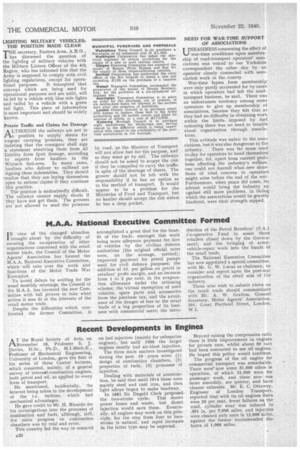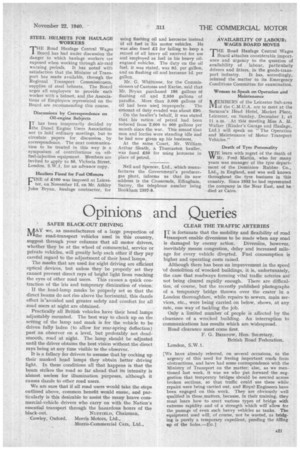Recent Developments in Engines
Page 22

Page 23

If you've noticed an error in this article please click here to report it so we can fix it.
AT the Royal Society of Arts, on ..November 18, Professor S. J. Davies, D.Sc., Ph.D., M.I.Mech.E.. Professor of Mechanical Engineering, University of London, gave the first of his series of three Cantor lectures, which consisted, mainly, of a general survey of interned-combustion -engines, both petrol and oil, as applied to every form of transport.
He mentioned, incidentally, the interest being taken in the development of the i.e. turbine, which had mechanical advantages.
He gave credit to Mr. H. Ricardo for his investigations into the processes of combustion and' fuels, although, still, the main progress on combustion chambers was by trial and error. . This country led the way in research on fuel injection (mainly for submarine engines), but until 1930 the larger engines mostly had air-blast injection.
The three main matters investigated during the past 10 years were: (1) design of combustion chambers, (2) properties of fuels, (3) processes of injection. • Dealing with materials of construction, he said that until 1914 these were mainly steel and cast iron, and then light alloys began to make headway.
In 1881 Sir Dugald Clerk proposed.the two-stroke cycle. This shows power losses and waste, but direct injection would save these. Eventually, all engines may work on this principle, for the step from four to twostroke is natural, and rapid increases in the latter type may be expected. Beyond raising the compression ratio there is little improvement in engines for private cars, whilst about 50 cars had been converted to use oil engines. He hoped this policy would continue.
The progress of the oil engine for commercial transport was remarkable. There were' now some 31,000 oilers in operation, of which 21,000 were for passenger work, and these now run more smoothly, are quieter, and have cleaner exhausts. Mr. E. C. Ottaway, Engineer of London Transport, reported that with its oil engines there were 20 per cent, fewer failures on the road, cylinder wear was reduced to .001 in. per 7,000 miles, and injectors were cleaned only once in 12,000 miles. against the former recommended distance of 1,000 miles. STEEL HELMETS FOR HAULAGE WORKERS
THE Road Haulage Central Wages Board has had under discussion the danger to which haulage workers are exposed when working through air-raid warning periods. It has noted with satisfaction that the Minister of Transport has made available, through the Regional Transport Commissioners, supplies of steel helmets. The Board urges all employers to provide each worker with a helmet, and the Associations of Employers represented on the Board are recommending this course.
Discussions by Correspondence on Oil-engine Subjects
II' has been temporarily decided by the Diesel Engine Users Association not to hold ordinary meetings, but to circulate papers for discussion _ by correspondence. The next communication to be treated in this way is a symposium of contributions on oilfuel-injection equipment. Members are invited to apply to 56, Victoria Street, London, S.W.1, for an advance copy.
Hauliers Fined for Fuel Offences
VINE of £100 was imposed at Leices.1.ter, on November 12, on Mr. Ashley John Bryan, haulage contractor, for
using flushing oil and kerosene instead of oil fuel in his motor vehicles. He was also fined £2 for failing to keep a record of all heavy oil received for use and employed as fuel in his heavy oilengined vehicles. The duty on the oil fuel, it was stated, was 9d. per gallon, and on flushing oil and kerosene id. per gallon.
Mr. G. Whittome, for the Commissioners of Customs and Excise, said that Mr. Bryan purchased 186 gallons of flushing oil and 2,950 gallons of paraffin. More than 3,000 gallons of oil had been used improperly. The amount of duty evaded was about £80.
On the haulier's behalf, it was stated that his ration of petrol had been reduced from 2,000 to 900 gallons per month since the war. This meant' that men and lorries were standing idle and he had now given up his business.
At the same Court, Mr. William Arthur Sleath, a Thurcastoia haulier, was fined £50 for using kerosene in place of petrol.
Neil and Spencer, Ltd., which manufactures the Government's producer.. gasplant, informs us that its new address is the Crossroads, Effingham, Surrey, the telephone number being Bookharn 2397-8. AVAILABILITY OF LABOUR: WAGES BOARD MOVES
THE Road Haulage Central Wages Board attaches considerable importance and urgency to the question of availability of labour, particularly drivers and fitters, in the goods-trans
port industry. It has, accordingly, referred the matter to its Emergency Conditions Committee for examination.
Woman to Speak on Operation and Maintenance UTEMBERS of the Leicester Sub-area 1VI of the C.M.U.A. are to meet at the Saracen's Head Hotel, Market Place, Leicester, on Sunday, December 1, at 11 a.m. At this meeting Miss A. M. Walker (Kinder's Garage and Haulage, Ltd.) will speak on " The Operation and Maintenance of Motor Transport Vehicles."
Death of Tyre Personality
WE learn with regret of the death of Mr. Fred Martin, who for many years was manager of the tyre department of the Dominion Rubber Co., Ltd., in England, and was well known throaghout the tyre business in this country. Since 1932 he had represented the company in the Near East, and he died at Cairo.




















































